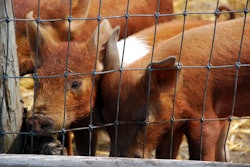After more than five years of deliberation, including an extended period for comments from stakeholders, the Department of Agriculture's (USDA) Grain Inspection, Packers and Stockyards Administration (GIPSA) final amended regulations take effect Friday, September 20, 2013.The USDA initially provided notice of proposed rulemaking related to the weighing of livestock and feed on February 11, 2008. The extended comment period for the proposed rules ended on May 21, 2008 after 33 comments were submitted. The final amended regulations were published in the Federal Register on August 21, 2013.
The amended regulations impose additional requirements on payments by live poultry dealers and swine contractors to poultry and swine production contract growers; these requirements are based on weighing of inputs and/or outputs. In addition, swine contractors are now subject to the reweighing and care and promptness regulations.
GIPSA has taken the position that these new requirements will ensure the fair and accurate weighing of feed, poultry and livestock. GIPSA believes the amended regulations will reduce the potential for live poultry dealers and swine contractors to engage in unfair and deceptive practices by delaying the weighing of livestock, incorrectly or inaccurately using scales, or denying requests for reweighing.
What are GIPSA Regulations?
GIPSA is authorized to issue regulations necessary to carry out and enforce the Packers and Stockyards Act of 1921 (P&S Act), as amended and supplemented. GIPSA's publication of P&S Act rules in the publicly available Federal Register and Code of Federal Regulations is intended to give all members of the swine and poultry industries clear direction about what is needed for compliance. Each violation of the P&S Act can garner a fine of up to $11,000 as well as additional enforcement action by GIPSA.
Which GIPSA Regulations were Amended?
The following GIPSA Regulations have been amended:
- § 201.49 - Requirements regarding scale tickets evidencing weighing of livestock, live poultry and feed
- § 201.76 - Reweighing
- § 201.82 - Care and promptness in weighing and handling livestock and live poultry
- § 201.108-1 - Instructions for weighing live poultry
How Does This Impact You?
Feed Manufactures and Dealers
Feed manufactures and dealers that grind, mix and/or deliver feed, weigh livestock or provide trucking services to swine and poultry growers, integrators or processors may need to alter the information contained on scale tickets and modify their procedures for weighing feed and livestock. These altered processes and documents will help customers comply with the amended GIPSA regulations.
If a customer uses weights of livestock or feed as a factor in determining payment or settlement to a livestock producer or poultry grower, the scale ticket or other basic transaction record must now show the following additional items:
- The city, state and the identity of the scale (if the location has more than one scale) used to weigh feed.
- A zero balance for both the gross weight and tare weight.
- The date and time the zero balance was determined.
- When using a vehicle scale to weigh feed for more than one producer or grower on the same multi-compartment truck, the preceding producer's or grower's gross weight can be used for the next producer's or grower's tare weight without printing a zero balance, and repeated until the unit is full.
In addition, when weighing feed, the certified scale must register a zero balance prior to beginning the weighing process. Typically, one zero balance documented on a scale ticket along with the tare and gross weight for the grower or truckload is sufficient. If the truck is moved from one scale to another to complete the weighing process, a separate zero balance must be recorded for the tare and gross weights. Once the scale registers a zero balance, a truck/trailer may be driven onto the scale to obtain the tare or gross weights of the truck/trailer and load.
Finally, because swine contractors are now subject to reweighing requirements, weighers should be aware that GIPSA may request that livestock and feed be reweighed. Customers are required to comply with those requests. It should also be noted that all scales are required to be in compliance with § 201.71 calibration and accuracy requirements.
Poultry Processors and Integrators
Since the 1987 amendments, the P&S Act has provided comprehensive federal regulation of the U.S. poultry industry. Several of these regulations have been amended requiring poultry processors and integrators to alter their protocols for weighing poultry, feed and recordkeeping.
Weighing of Poultry
When the weight of live poultry is a factor in calculation of payment to a grower under a poultry growing agreement the Reasonable Care and Promptness regulations of § 201.82 apply. This section has been amended and now requires that the process of obtaining the gross weight (including fueling, uncoupling the trailer, changing the road tractor to a yard tractor or weighing the trailer only) be conducted within a time period of 30 minutes between arrival and completion of the process of obtaining the gross weight.
In addition, live poultry dealers are now prohibited from using "split loads" in which poultry from multiple growers are placed on a single live poultry transport trailer or live poultry transport equipment. The city, state and identity of the scale (if there are multiple at the location) must be printed on the scale ticket along with the zero balance for both the gross weight and tare weight. The date and time the zero balance was determined must also be recorded. For company owned or operated scales used for the weighing of livestock, unused and partially executed scale tickets must not be left exposed or accessible to other parties. Except for scales located at feed mills, they must be kept under lock and key when the weigher is not at the scale.
Weighing of Feed
Regulations when the weight of feed is a factor in calculating payment to the grower under a poultry growing agreement have been similarly amended. For company owned or operated scales used for weighing feed, unused and partially executed scale tickets cannot be left exposed or accessible to other parties andmust be kept under lock when the weigher is not at the scale (scales located at feed mills are exempt from locking tickets when unattended). Additionly, "feed" is now regulated under § 201.108-1 regarding instructions for weighing live poultry and feed.
Specific provisions requiring that scales be balanced have also been added. Mechanically printed scale tickets or other basic transaction records now must include the zero balance as well as the time and date the empty scale was balanced. When a feed hopper attached to an electronic digital scale is used the digital scale must be balanced at zero prior to the first weighment for each grower/truckload. The date and time the empty hopper scale was balanced along with proof of the zero balance must be mechanically printed on the scale ticket or other permanent record and attached to the grower's copy.
When an onboard weighing system is used, it must be level, locked in position and zero-balanced prior to weighing. As with feed hopper systems, the date and time that the onboard scale was balanced, as well as proof of the zero balance, must be mechanically printed on the scale ticket or other permanent record, and attached to the grower's copy. However, when more than one grower's feed is weighed via an onboard system, the preceding grower's gross weight can be used for the next grower's tare weight, and can be repeated until the unit is full. Notably, the feed must be reweighed prior to delivery to another grower.
When returned feed from a contract poultry grower is picked up and weighed on an onboard weighing system, the weight of the feed must be recorded and a ticket printed. That weight must be used as the tare weight when feed from another contract poultry grower is picked up on the same load. This procedure must be followed each time another grower's feed is added to the load.
Pork Processors and Integrators
GIPSA has required the reweighing of hog carcasses at slaughter plants for many years. The carcasses are returned by rail to the hot weight scale before entering the cooler, or the chain is stopped and carcasses are transported back for placement on the hot weight scale for reweighing. (GIPSA regulations provide similar provisions for the poultry industry.)
The amended GIPSA regulations now require this reweighing provision also be applied to swine contractors for the weighing of livestock and feed. Additionally, amended regulation § 201.49(b) now requires the name, initials, or identification number of the weigher of each carcass be printed on the scale ticket. (This requirement does not apply to automated weighing systems where a weigher is not stationed at the scale.)
This means that any contract in which payment under the contract utilizes weights of swine or feed as a factor in determining payment or settlement (e.g, actual feed conversion, rate-of-gain or similar metrics linked to feed or swine weight) is now subject to reweighing requirements. Notably, in the discussion and comments to the amended regulations GIPSA has generally taken the position that swine contractors will be required to reweigh, upon request of GIPSA personnel, feed and hog carcasses but not feeder and weaner pigs from a grower's farm.
For company owned or operated scales used for the weighing of feed or livestock, unused and partially executed scale tickets must not be left exposed or accessible to other parties and, except for scales located at feed mills, must be kept under lock when the weigher is not at the scale. It should also be noted that all scales are required to be incompliance with § 201.71 calibration and accuracy requirements.
Feed and livestock scale tickets or other basic transaction records must now show the following additional items:
- The city, state and the identity of the scale (if the location has more than one scale) used to weigh feed.
- A zero balance for both the gross weight and tare weight.
- The date and time the zero balance was determined.
- When using a vehicle scale to weigh feed for more than one producer or grower on the same multi-compartment truck, the preceding producer's or grower's gross weight can be used for the next producer's or grower's tare weight without printing a zero balance, and repeated until the unit is full.
In addition, when weighing feed, the certified scale must register a zero balance prior to beginning the weighing process. Typically, one zero balance documented on a scale ticket along with the tare and gross weight for the grower or truckload is sufficient. If the truck is moved from one scale to another scale to complete the weighing process, a separate zero balance must be recorded for the tare and gross weights. Once the scale registers a zero balance, a truck/trailer may be driven onto the scale to obtain the tare or gross weights of the truck/trailer and load.
Finally, swine contractors are now regulated under the care and promptness of weighing regulations. Regulation § 201.82(a) now requires swine contractors (along with other parties as defined in 7 U.S.C. 182 of the P&S Act) to exercise "reasonable care and promptness with respect to loading, transporting, holding, yarding, feeding, watering, weighing or otherwise handling livestock or live poultry to prevent waste of feed, shrinkage, injury, death or other avoidable loss."
The Cattle, Sheep, Horse, Goat and Mule Industries
The definition of livestock under the P&S Act also includes cattle, sheep, horses, goats and mules. As a consequence, many of the regulations referenced in this update also apply to these industries. This update focuses on the poultry and swine industries as a result of the integrated structure of those industries. However, an appropriate inquiry should be made by processors and integrators in all industries to ensure compliance with the P&S Act and GIPSA regulations.
For more information on how food and agricultural industry professionals can help you, please contact Jacob Bylund, Kim Walker or Scott Halbur.
Jacob Bylund is a partner and Scott Halbur is an associate at Faegre Baker Daniels LLP. FaegreBD opened a Silicon Valley office on July 1, 2014 and serves food and agriculture businesses in California and nationally.
.jpg?auto=format%2Ccompress&crop=faces&fit=crop&h=48&q=70&w=48)

















